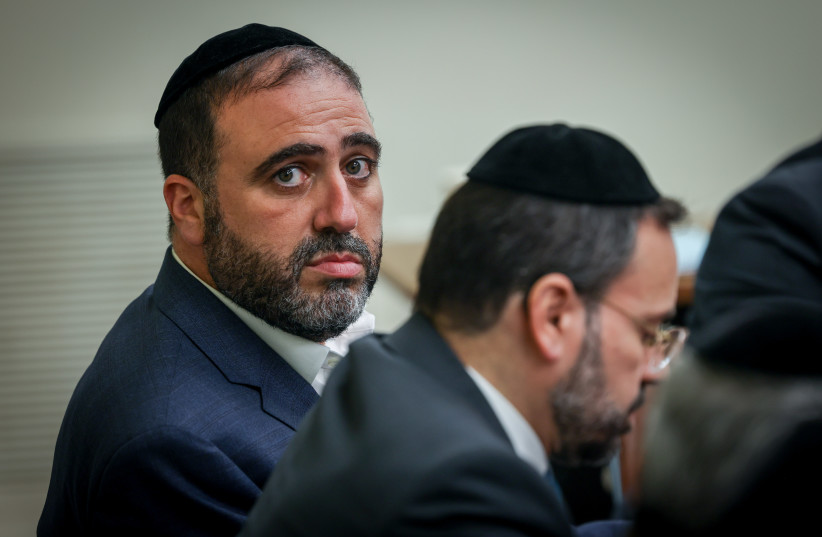The haredi public must internalize that they will need to begin committing national service, Interior Minister Moshe Arbel (Shas) said in a podcast that was published on Thursday.
The comment was rare, as haredi leaders have largely refrained from taking the side of increasing haredi service since a crisis over the issue broke out in February, when the defense ministry revealed that it was planning on overcoming a lack of manpower by increasing mandatory and reserve duty, and not by drafting thousands of haredi men, who enjoyed a blanket exemption.
The legal foundation for this exemption expired on March 31, and according to a Supreme Court temporary directive on March 28, the state is now required to draft haredi men, and must provide by April a progress report on the matter. The court will hear the case of whether to make the directive permanent on June 2.
"The reality after October 7 is that the haredi public must understand and internalize that there is no moral option to continue this way," Arbel said on a podcast by an organization called "Hariv'on Herivi'i" [Hebrew for ""Fourth Quarter"] that was recorded weeks ago but published on Thursday.
Arbel added that there were 1,500 men in every haredi age-group who could be drafted immediately, and "who must be part of those carrying the burden."

"In addition, there are more than a few institutions defined as being for at-risk youth. All of these institutions – there is no justification in the world that those for whom Torah is not their vocation, will not be a part of the army," Arbel said.
Arbel made similar comments during an interview with the Jerusalem Post that will be published in the Magazine section on the first Passover holiday (April 22).
According to its website, "Hariv'on Herivi'i" is an "all-Israeli civil mass movement, working for the transition of Israeli democracy from a politics of submission and victories to a 'politics of hospitality' and solutions."
Statement released by Shas party
Shas, which represented Sephardic Israelis, put out a statement on Thursday apparently in response to Arbel's comment:
"The topic of the conscription law and the status of the holy yeshiva students, is bestowed only in the hands of … Moetzet Chachmei HaTorah [Hebrew for "Council of Torah Sages"] … and is managed by the movement's chairman Rabbi Aryeh Deri and his representative in the negotiations Rabbi Ariel Atias. The movement's representatives were instructed not to speak at all on the topic. Shas's stance is expressed only by the Shas movement's official organs."
Arbel's comments came after a number of conflicting public statements by rabbis affiliated with the Shas in the past week. These included a letter signed by some of its leading rabbis calling for no conscription whatsoever, but also a statement by Rabbi Moshe Maya, a former Knesset member for Shas and current member of the Council of Torah Sages, in favor of the ongoing negotiations on the matter.
Thursday included additional developments regarding haredi conscription, on a number of fronts.
On the legal front, the Attorney General's Office revealed in a letter to the government that it has yet to receive for legal examination a plan for conscription that reflects the current legal situation. The letter was a response to a letter from Government Secretary Yossi Fuchs to the AG demanding independent representation in the pending court case on the situation. The AG is the government's statutory legal council before the Supreme Court, but Fuchs claimed that there was an "essential gap" between the government and the AG's positions that was "unbridgeable." The AG's answer was that the government has yet to put forward any position whatsoever that had "real content" or was based on "fundamental professional basis," and therefore could not examine whether or not the positions were compatible.
The letter did reveal, however, that talks were being held "at a number of levels" in the defense establishment to come up with a government-proposed bill. The AG's office stressed that until such a bill passes, continuing the blanket exemption was illegal and the government was required by law to draft haredi men of the appropriate age.
On the negotiation front, Kikar Hashabat's Yishai Cohen reported that the current number being discussed is 25% of every haredi age group. There are approximately 12,000 men in every age group, and this would mean 3,000 every year – far more than the current numbers. According to Cohen, there would also be closer oversight of yeshivot by the authorities, and sanctions if these numbers are not met.
Opposition leader MK Yair Lapid responded to the report, calling it a "completely transparent scam" and arguing that "whoever studies the details understands that not one haredi will enlist with this plan."
"Stop lying and bring a bill that is not another cheat and a discrimination between people based on blood," Lapid said.
On Thursday afternoon, thousands of members of the extremist Peleg Yerushalmi group gathered for a demonstration outside of the Jerusalem Recruitment Center against any concessions on the IDF draft. This group historically has been most vocal in its opposition to government initiatives affecting their lifestyle.
